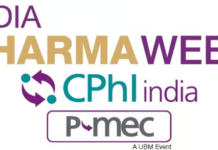New Delhi, November 11, 2020: Pharma companies are rethinking the importance of corporate brands as the industry’s work fighting COVID-19 offers an opening to boost their reputations. Kate Cronin, the newly tapped global CEO of Ogilvy Health, sees that reflected in new business briefs, with pitches now centered on reputation and societal impact.
The agency veteran has been at Ogilvy for 16 years in roles spanning healthcare and consumer and from heading public relations to running brand teams, including household names Ford, TJ Maxx and Unilever along with health and pharma brands.
Pharma corporate communications and strategy are now “connecting with a straight line versus a dotted line to product marketing,” she said.
“A lot of the briefs that we’re getting now are around reputation and societal impact. No longer do you get a brief that says, ‘We’re going to be marketing product X.’ Now, it’s, ‘We’re going to be marketing product X, and we need to position it in the world and how we make a societal impact. And we need to connect it to our corporate reputation,’” Cronin added.
That’s partly because of the COVID-19 pandemic and pharma’s general realization that it has an opportunity now to boost reputations both industrywide and at individual companies. But at the same time, marketers are watching consumers’ shift to digital and realizing the need to build more direct relationships with educated and empowered patients.
“Pharmaceutical companies recognize they have to justify their societal impact and that it’s important for customers—patients and HCPs—to understand what they stand for,” Cronin said. “The word innovation alone doesn’t differentiate one pharma company from another; it needs to be deeper than that.”
The pharma rethinks come as COVID-19 news makes big headlines, drawing even more attention to the industry.
All eyes are on Pfizer and German mRNA biotech partner BioNTech, which released an early look at their experimental pandemic vaccine yesterday, showing their vaccine was more than 90% effective in preventing COVID-19 in participants according to the reports published in fiercepharma.com.
Eli Lilly today nabbed an emergency use authorization from the FDA for its monoclonal antibody to treat mild-to-moderate COVID-19 cases. Meanwhile, Regeneron continues to bask in the promise of its own antibody cocktail as it amps up efforts to manufacture 300,000 doses.
Cronin most recently served as co-president of Ogilvy Health alongside Andrew Schirmer, who has now left the company.
She sees her expanded global job as the lead “navigator” for Ogilvy pharma and health clients to tap the best relevant resources across all Ogilvy agencies.
For instance, how can pharma companies leverage the experience of Ogilvy’s Lacek Group loyalty agency, which works with hotels and car rental companies? Or figure out where Social Lab’s online community expertise might fit into building a connected app?
“We’re looking at Ogilvy as a store where we have different storefronts—the PR door, the advertising door, CRM door or others,” Cronin said. “So, how do we become the sort of personal shopper for our clients to give them what they need to grow?”
While the year has been challenging because of the pandemic, business is strong and growing in new areas such as telehealth. Businesses that have been forced to innovate are turning to agency partners to help them figure out how—with resulting lessons for both, she said.
“All these years, pharma companies have been at the bottom of reputation lists—closely following government or oil—and it’s always been hard to believe when they’re providing these innovative therapies,” Cronin said, adding, “Now, there’s a chance to change that.”






















